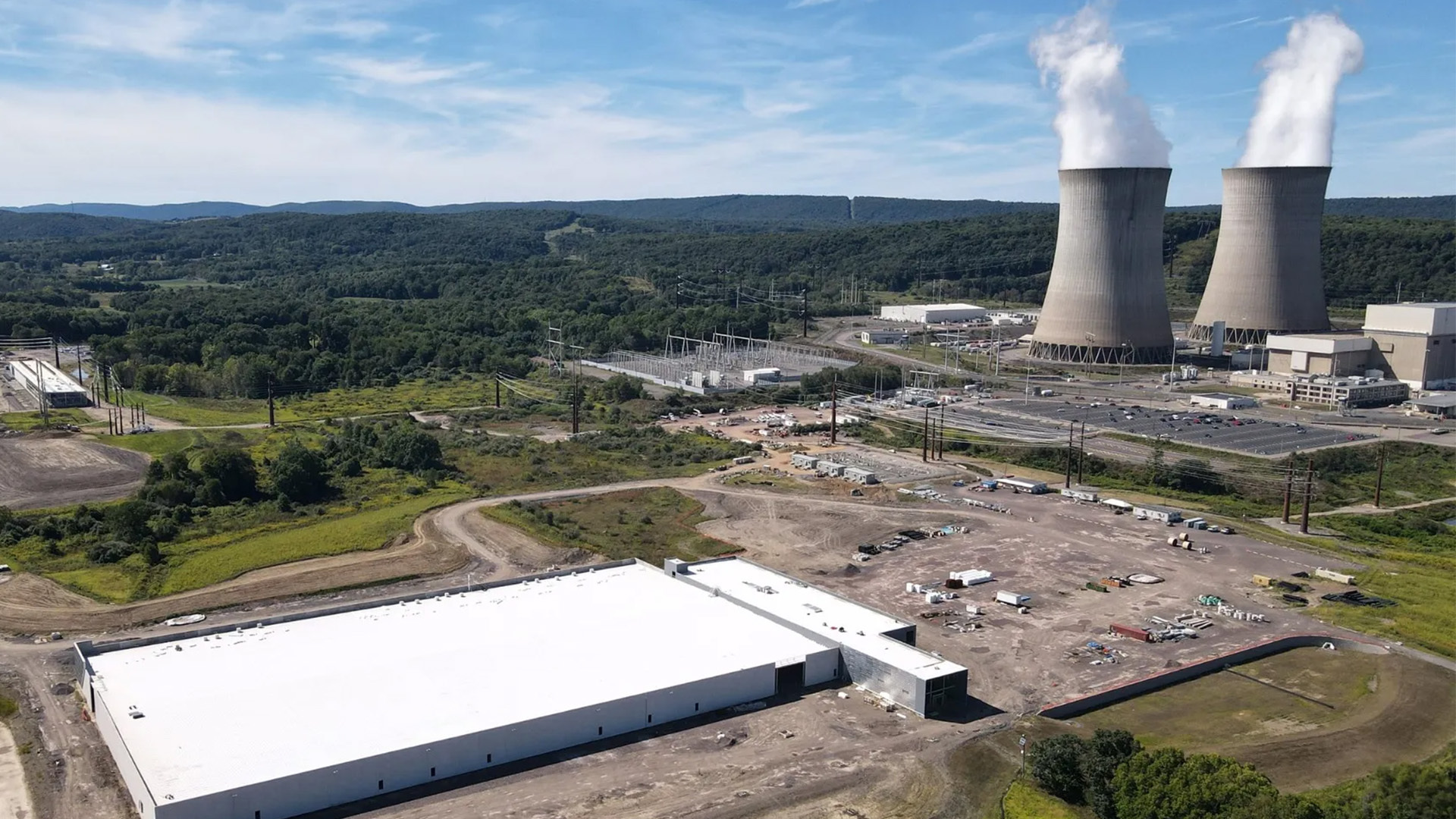
Amazon wants more nuclear power, but regulators fear spike in consumer costs
By Jack Aylmer (Energy Correspondent), Zachary Hill (Video Editor)
Federal regulators recently denied Amazon’s request for additional nuclear power to support its expanding data center operations. The Federal Energy Regulatory Commission (FERC) ruled 2-1 against the proposal, citing concerns that granting tech companies greater access to nuclear energy could drive up consumer costs and strain grid reliability.
Media Landscape
See how news outlets across the political spectrum are covering this story. Learn moreBias Distribution
Left
Right
Untracked Bias
In addition to Amazon, other tech giants, such as Meta and Microsoft, have increasingly explored running their energy-intensive data centers with nuclear power. Unlike other renewable sources, nuclear energy offers a continuous flow of electricity, making it attractive to companies that are pledging to reduce their carbon footprints while maintaining consistent power supplies for the ever-growing demands of data centers.
However, the FERC decision represents a new hurdle for the industry’s broader ambitions in nuclear energy adoption.

Download the SAN app today to stay up-to-date with Unbiased. Straight Facts™.
Point phone camera here
Amazon’s nuclear power proposal followed its March $650 million acquisition of a Pennsylvania data center campus from Talen Energy, a major U.S. energy provider.
The facility is powered by Talen Energy’s adjacent nuclear plant, and Amazon had sought regulatory approval to increase its electrical draw from the facility, but the FERC concluded that allowing the tech giant’s plan to move forward could lead to energy price hikes and threaten overall grid stability.
“Arrangements of the type presented here present an array of complicated, nuanced and multifaceted issues, which collectively could have huge ramifications for both grid reliability and consumer costs,” Mark Christie, a Republican FERC commissioner, wrote in a concurring statement.
In a dissenting opinion, the lone commissioner that voted to support Amazon’s proposal, Democratic chair Willie Phillips, argued that partnerships between nuclear plants and data centers are essential for the energy transition, asserting that blocking these arrangements could negatively impact both energy reliability and national security.
“I respectfully dissent from today’s order because it is a step backward for both electric reliability and national security,” Phillips wrote. “In failing to accept the agreement, we are rejecting protections that the interconnected transmission owner says will enhance reliability while also creating unnecessary roadblocks to an industry that is necessary for our national security.”
Get up to speed on the stories leading the day every weekday morning. Sign up for the newsletter today!
Learn more about our emails. Unsubscribe anytime.
By entering your email, you agree to the Terms & Conditions and acknowledge the Privacy Policy.
Analysts suggest that the decision may deter similar deals between nuclear providers and data center operators, potentially affecting future investments in nuclear energy. The ruling appears to have impacted investor confidence in this energy source, as this week saw a dip in stocks among nuclear power providers, signaling a market response to the potential regulatory challenges ahead.
Despite the setback, Amazon and Talen Energy will proceed with the initial phases of the data center campus, using the nuclear power already available. Both companies have expressed their intent to continue seeking regulatory approval for expanded power use.
[Jack Aylmer]
AMAZON’S REQUEST FOR MORE NUCLEAR POWER HAS BEEN REJECTED BY FEDERAL REGULATORS-
WHO WORRY THE PROPOSAL WOULD INCREASE CONSUMER ENERGY COSTS.
MEETING THE EVER GROWING ENERGY DEMANDS FROM DATA CENTERS HAS LED A NUMBER OF BIG TECH FIRMS TO EXPLORE NUCLEAR POWER-
WHICH CAN PROVIDE A CONTINUOUS FLOW OF ELECTRICITY UNLIKE OTHER RENEWABLES, WHILE STILL ALLOWING THESE COMPANIES TO MEET THEIR CARBON CUTTING GOALS.
BUT THIS INDUSTRY-WIDE INTEREST IN NUCLEAR ENERGY NOW FACES A NEW CHALLENGE AFTER WHAT’S HAPPENED WITH AMAZON.
BACK IN MARCH, THE TECH GIANT PURCHASED A DATA CENTER CAMPUS FROM TALEN ENERGY.
SPENDING 650 MILLION DOLLARS TO BUY THE FACILITY-
WHICH DRAWS POWER FROM TALEN’S ADJACENT NUCLEAR POWER PLANT.
AFTER THE SALE, AMAZON WANTED TO EXPAND OPERATIONS ON THE SITE-
AND ASKED FOR PERMISSION TO RECEIVE MORE POWER FROM THE NUCLEAR PLANT TO SUPPORT THESE AMBITIONS.
HOWEVER, LATE LAST WEEK, THE FEDERAL ENERGY REGULATORY COMMISSION DECIDED IT WOULD NOT ALLOW AMAZON TO DO THIS.
SAYING IN THEIR TWO TO ONE RULING THAT LETTING TECH COMPANIES DERIVE MORE POWER FROM EXISTING NUCLEAR PLANTS COULD CAUSE ENERGY PRICES TO SPIKE AND IMPACT GRID RELIABILITY.
THE ONE COMMISSIONER WHO VOTED FOR ALLOWING AMAZON’S PLAN TO MOVE FORWARD WROTE IN A DISSENTING OPINION THAT POWER AGREEMENTS LIKE THESE ARE A NECESSARY PART OF THE CURRENT ENERGY TRANSITION-
AND THAT DENYING IT IS A STEP BACKWARD FOR BOTH ELECTRIC RELIABILITY AND NATIONAL SECURITY.
INDUSTRY ANALYSTS NOTE THIS COULD THROW A WRENCH IN CURRENT AND FUTURE ENERGY ARRANGEMENTS BETWEEN NUCLEAR PLANTS AND DATA CENTERS.
A WARNING INVESTORS APPEAR TO BE TAKING SERIOUSLY-
WITH STOCKS IN SEVERAL MAJOR NUCLEAR POWER PROVIDERS FALLING THIS WEEK.
MEANWHILE, DESPITE THE REJECTION, AMAZON AND TALEN ENERGY ARE STILL ABLE TO USE SOME NUCLEAR POWER TO RUN THE DATA CENTER CAMPUS- JUST NOT AS MUCH AS THEY WOULD HAVE LIKED.
THE TWO COMPANIES WILL BEGIN THE FIRST PHASES OF DEVELOPING THIS FACILITY WITH THE NUCLEAR ENERGY THAT IS AVAILABLE-
AS THEY CONTINUE TO PURSUE APPROVAL OF THEIR RECENT PLANS FOR MORE POWER.
TO GET MORE STORIES ABOUT HOW NUCLEAR ENERGY IS PLAYING AN INCREASINGLY LARGER ROLE IN THE TECH SECTOR, DOWNLOAD THE STRAIGHT ARROW NEWS APP AND SIGN UP FOR ALERTS FROM ME- JACK AYLMER.
Media Landscape
See how news outlets across the political spectrum are covering this story. Learn moreBias Distribution
Left
Right
Untracked Bias
Straight to your inbox.
By entering your email, you agree to the Terms & Conditions and acknowledge the Privacy Policy.
MOST POPULAR
-
 Getty Images
Getty Images
Zelenskyy leaves WH early; Trump says he can come back when ‘ready for peace’
Watch 2:245 hrs ago -
 Getty Images
Getty Images
Police raid California mayor’s house, city hall in $14 million corruption probe
Watch 2:0520 hrs ago -
 Getty Images
Getty Images
Widely-used handgun banned from Washington state training facilities
Watch 2:4022 hrs ago -
 Reuters
Reuters
Connecticut teen sues former school after graduating unable to read, write
Read23 hrs ago




